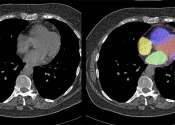Climb stairs to live longer, say cardiologists
Climbing stairs is associated with a longer life, according to research presented at ESC Preventive Cardiology 2024, a scientific congress of the European Society of Cardiology (ESC).
19 hours ago
1
205
Climbing stairs is associated with a longer life, according to research presented at ESC Preventive Cardiology 2024, a scientific congress of the European Society of Cardiology (ESC).
19 hours ago
1
205

Cleveland Clinic researchers are using artificial intelligence to uncover the link between the gut microbiome and Alzheimer's disease.
Apr 22, 2024
0
73

A multicenter study led by Vanderbilt University Medical Center (VUMC) and Lipscomb University College of Pharmacy in Nashville has identified a potential new treatment for acute heart failure, a leading cause of hospitalization ...
Apr 25, 2024
0
35

A recent study designed and implemented by investigators at Cedars-Sinai found that artificial intelligence (AI) can accurately evaluate cardiovascular risk during a routine chest computed tomography (CT) scan without contrast.
Apr 24, 2024
0
28

A budget-busting 3.6 million Medicare recipients could now be eligible for coverage of the weight-loss drug Wegovy, a new KFF analysis says.
Apr 24, 2024
0
3

As patients with congenital heart diseases live longer, researchers are attempting to understand some of the other complications they may face as they age. A team from Children's Hospital of Philadelphia (CHOP) used state-of-the-art ...
Apr 24, 2024
0
0

An international group of noise experts from the Copenhagen Cancer Institute (Denmark), the Swiss Tropical and Public Health Institute (Swiss TPH), the Perelman School of Medicine at the University of Philadelphia (U.S.) ...
Apr 25, 2024
1
0

Researchers from Aston University have found that people following healthy eating accounts on social media for as little as two weeks ate more fruit and vegetables and less junk food. The work is published in the journal ...
Apr 24, 2024
0
0

The number of Hispanic organ donors in the U.S. has increased in recent years, but that growth has been slow. Although organs are not matched by race and ethnicity, a significant gap remains between donors and transplant ...
Apr 22, 2024
0
0

Severe mental illness can contribute to a decline in a person's physical health, with many chronic conditions slowly eroding their wellness, a new review finds.
Apr 23, 2024
0
2

Cardiovascular disease or heart disease are a class of diseases that involve the heart or blood vessels (arteries and veins). While the term technically refers to any disease that affects the cardiovascular system (as used in MeSH C14), it is usually used to refer to those related to atherosclerosis (arterial disease). These conditions usually have similar causes, mechanisms, and treatments.
Cardiovascular diseases remain the biggest cause of deaths worldwide, though over the last two decades, cardiovascular mortality rates have declined in many high-income countries but have increased at an astonishingly fast rate in low- and middle-income countries. The percentage of premature deaths from cardiovascular disease range from 4% in high-income countries to 42% in low-income countries. More than 17 million people died from cardiovascular diseases in 2008. Each year, heart disease kills more Americans than cancer. In recent years, cardiovascular risk in women has been increasing and has killed more women than breast cancer. (PDAY) showed vascular injury accumulates from adolescence, making primary prevention efforts necessary from childhood.
By the time that heart problems are detected, the underlying cause (atherosclerosis) is usually quite advanced, having progressed for decades. There is therefore increased emphasis on preventing atherosclerosis by modifying risk factors, such as healthy eating, exercise, and avoidance of smoking.
This text uses material from Wikipedia licensed under CC BY-SA